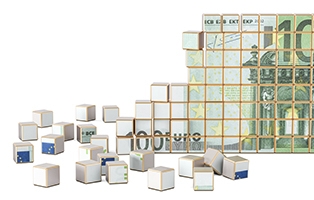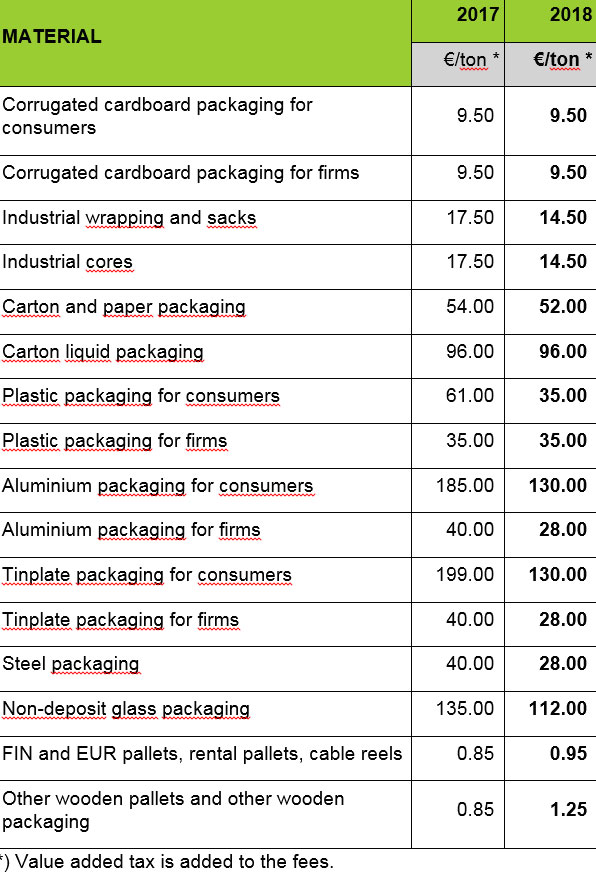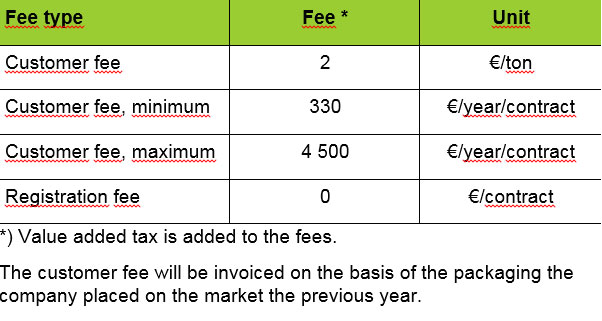An efficient future

The recycling requirements for packaging waste that come with the producer responsibility have changed throughout the Finnish packaging recycling system in the last couple of years. Juha-Heikki Tanskanen, Managing Director of Finnish Packaging Recycling RINKI Ltd, says that the system is currently in good shape.
“The system works, the quality is good and the operations are efficient. The efficiency of logistics related to the collection of packaging waste is particularly important and also the biggest expense of the operation. Logistical performance has already been improved significantly, and development efforts in this area are continuing.”
Customer fee based on the amount of packaging
From the beginning of next year, Rinki will introduce a customer fee that will replace its old annual fee. Until now, companies have paid a fixed annual fee determined by their turnover. The new customer fee, on the other hand, is based on the company’s packaging volume the previous year.
“For a vast majority of companies the fee will be lower. The new practice is also fairer because a company may have a lot of operations that do not fall under the scope of producer responsibility,” says Sari Hedayet, Rinki’s Financial Manager.
The companies’ workload will also be lighter as they will no longer have to report their turnover data to Rinki.
The new minimum customer fee is 330 euros per year and the maximum fee is 4,500 euros.
Only one payment for one business ID
Another major reform related to the introduction of the customer fee is that under the new contractual terms a company can have a single contract that covers all the sites operating under the same business ID.
“The method of submitting the turnover data for each site has been considered laborious, and we have responded to customer feedback with this change,” says Tanskanen.
According to the new terms, a joint contract can be signed by a group, central company, chain organisation or franchisor that has the right to represent the companies that have joined the contract.
“Our aim has been to make reporting easier for companies and standardise the basis for the fees so that they are fairer,” Tanskanen and Hedayet explain.
How does a company sign the new contract?
It is not difficult. Rinki has already sent a newsletter to companies that have a contract. A company is deemed to have accepted the terms of contract coming into force on 1 January 2018 if it does not inform Rinki in writing within one month of receiving the terms of contract that it will terminate its existing contract.
In addition, Rinki will contact those companies whose contract needs to be updated.
Recycling fees are decreasing
The good news about the material-specific recycling fees for 2018 is that most of them will decrease slightly or remain unchanged. The only pressure to increase the recycling fees has been for wooden packaging, and they will rise a little.
The total invoice for the producer responsibility activities in 2017 was about 21 million euros, but next year it will decrease by an estimated 3.5 million euros.
“We have managed to organise the collection of consumer packaging at well below the budgeted cost,” Tanskanen is happy to report.
“In previous years, the pressure to increase the fees has also been a result of the producer organisations having had to strengthen their solvency. This issue has now been taken care of.”
Streamlining the operations has also helped to keep the costs under control. The recycling of glass packaging is an example of how the choice of partners can play a big role: from the beginning of next year, Rinki will start cooperation with the Dutch company Maltha Groep BV.
Recycling fees for packaging 2018

Packaging for consumers comprises product packaging designed to end up with consumers or in households, such as retail sales packaging.
Packaging for firms means product packaging intended for use only in trade in industry or between enterprises as unit and transport packaging, and in transportation between industry and the retail trade. Packaging used for showcasing products in stores also comprises packaging for firms.
RINKI Ltd´s registration and customer fees

The scope of the obligation to recycle widens
The biggest challenges facing the collection of consumer packaging and producer responsibility are related to legislation and any changes that may follow. The recycling requirements imposed by the EU are on the rise, and the Commission’s proposal requires 75 per cent of waste to be recycled in 2030.
“If the scope for producer responsibility widens, the fees will rise accordingly. It can only be curbed by doing things already now as smartly and efficiently as possible,” estimates Tanskanen.
The recycling targets for different materials are also increasing. For example, 75 per cent of wooden packaging should be recycled by 2030, while the current figure is 30 per cent.
“There is plenty of virgin timber in Finland that is commonly used as fuel, and wooden packaging waste therefore doesn’t have a natural sink. The worst-case scenario would be to export wood chips for use by the chipboard industry in Central Europe; that would make no sense at all. Not all rules and regulations can be applied in every country, but it is practically impossible to be granted exemptions,” says Tanskanen.
In any case, the producer responsibility scheme is here to stay.
Tanskanen points out that producer responsibility will continue to be an important tool for control in the EU circular economy package.
For the scheme to succeed, collaboration is required with all stakeholders – consumers, businesses and shops.
“This change can’t be successful unless the entire chain is committed to it. Fortunately, everyone agrees that these are important issues for both society and the environment.”
https://rinkiin.fi/news/news-releases/fees-2018/
7.12.2017
Text Sami Turunen
Photo iStockphoto